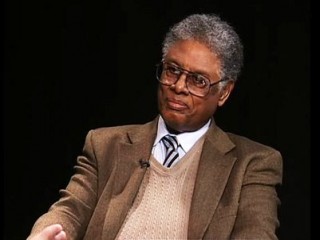
Thomas Sowell biography
Date of birth : 1930-07-30
Date of death : -
Birthplace : Gastonia, North Carolina
Nationality : American
Category : Arhitecture and Engineering
Last modified : 2011-07-13
Credited as : Economist, social theorist, author
11 votes so far
Career:
Hoover Institution Senior Fellow (1980-)
Keyes 2004
National Humanities Medal 2002
Thomas Sowell (born 1930) is noted for his conservative views on social and economic issues. An African American author and economist, Sowell opposes such programs as affirmative action, busing, racial quotas, minimum wage, and welfare. He has drawn fire from liberals and a number of African American
Sowell is an advocate of the "pull yourself up by the bootstraps" philosophy, which encourages people to improve their positions not by government intervention, but by personal ambition and hard work. He believes that government initiatives to ensure a fair playing field for African Americans have actually hurt their chances for equality. Regardless of whether or not one agrees with his views, Sowell is respected as a top economist, having published extensively in economic journals and general periodicals. He also spent the better part of three decades teaching in prestigious academic institutions. Into the 1990s, his name was commonly seen in a weekly column for Forbes magazine and on his syndicated column appearing in newspapers nationwide. Sowell is the author of over 20 books and has edited or contributed to others. "The word 'genius' is thrown around so much that it's becoming meaningless," remarked renowned economist Milton Friedman in Forbes, "but nevertheless I think Tom Sowell is close to being one."
Sowell was born June 30, 1930, in Gastonia, North Carolina, and spent much of his youth in Charlotte, North Carolina. Being a very private person, not much is known about his family or early years, except that he moved to Harlem in New York City with his parents at around the age of eight or nine. His father worked in the construction industry. Sowell attended classes for gifted students and was ranked at the top of his class at the prestigious Stuyvesant High School. He left school in tenth grade and worked for the next four years in a factory, as a delivery person, and as a Western Union messenger. These lean early years would heavily influence his politics later in life and provide him with arguments during debates with liberal leaders.
Sowell completed high school by attending night classes, then was drafted to serve in the U.S. Marine Corps in 1951. He spent two years at Camp Lejeune, North Carolina, where he worked as a photographer. Thanks to the G.I. Bill, he enrolled at Howard University in Washington, D.C., a majority African American institution, while working part-time as a photographer and a civil service clerk for the General Accounting Office. After three semesters, Sowell transferred to Harvard University. There, he wrote his senior thesis on the German political philosopher, Karl Marx. Sowell graduated magna cum laude with a bachelor's degree in economics in 1958. A Marxist sympathizer as an undergraduate, Sowell gradually became more conservative as he pursued his master's degree at Columbia University. He continued his education at the University of Chicago, where he studied under economist and Nobel laureate, Milton Friedman, and George Stigler. Sowell obtained his Ph.D. from the University of Chicago in 1968.
Sowell began his illustrious professional career as a summer intern in 1960, then as an employee of the U.S. Department of Labor in 1960-61 as an economist. From there, he taught at Rutgers (1962-63) and Howard (1963-64) universities, later taking a post as an economic analyst with AT&T from 1964-65. Sowell taught from 1965-69 as an assistant professor of economics at Cornell and spent the summer of 1968 there as the director of the Summer Intensive Training Program in Economic Theory. After teaching from 1969-70 at Brandeis, Sowell went to the University of California, Los Angeles (UCLA) as an associate professor of economics, where he was promoted to full professor in 1974. He also served as project director of the Urban Institute from 1972-74. Sowell stayed at UCLA until 1980 and also taught there from 1984-89. In 1980, he was named a senior fellow at Stanford University's Hoover Institution.
In 1980, Ronald Reagan took control of the presidency and ushered in a conservative political era that would last most of the decade. It seemed that Sowell's time had come. He organized a Black Alternatives Conference in San Francisco to publicize the conservative voice of African Americans. About 100 Republican business professionals and educators attended, advocating right-wing policies such as lowering the minimum wage, doing away with rent control, and reorganizing federal programs. After that event, Edwin Meese III, then the director of Reagan's transition team, announced that the new president would appoint African Americans to his cabinet and other high-level positions. Sowell was offered a cabinet post, but did not even entertain the notion. According to a Newsweekpiece from the time, "Such active participation in politics … would only damage his scholarly reputation." In February 1981, Sowell agreed to serve on the White House Economic Advisory Board, but resigned after one meeting. The distance between Washington, D.C. and his home in Palo Alto, California, was "too much of a strain," as People Weekly reported.
Author of books:
Race and Economics (1975)
Markets and Minorities (1981)
Ethnic America: A History (1981)
Marxism: Philosophy and Economics (1986)
The Vision of the Anointed: Self-Congratulation As a Basis for Social Policy (1996)
A Personal Odyssey (2000, memoir)
The Quest For Cosmic Justice (2002)
A Conflict of Visions: Ideological Origins of Political Struggles (2002)
Controversial Essays (2002)
The Einstein Syndrome: Bright Children Who Talk Late (2002)
Inside American Education (2003)
Applied Economics: Thinking Beyond Stage One (2003)
Affirmative Action Around the World: An Empirical Study (2004)
Black Rednecks and White Liberals (2005)
















